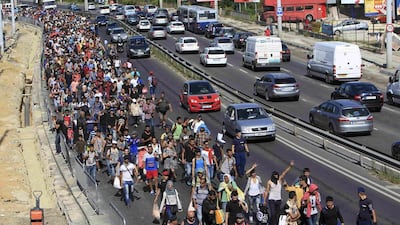Budapest // Refugees stranded at Budapest’s main rail station for days set off on foot for the Austrian border on Friday, despite mounting efforts by Hungary to crack down on a deepening crisis that is straining Europe’s unity.
Germany urged an end to “recriminations” as Britain said it would take in thousands more Syrian refugees – but only direct from camps, not those already in overstretched Hungary, Greece and Italy who are demanding their EU partners do more to help.
Hungary has become the newest flashpoint as thousands of migrants try to get to western Europe, particularly Germany which has said it will no longer deport Syrian refugees and will take in 800,000 people this year.
In the Hungarian capital, a crowd of more than 1,000 migrants, including people in wheelchairs and on crutches, set off for the Austrian border 175 kilometres away.
“We are very happy that something is happening at last. The next stop is Austria. The children are very tired, Hungary is very bad, we have to go somehow,” said 23-year-old Osama from Syria.
Some flashed victory signs while others carried pictures of German chancellor Angela Merkel, who recently eased asylum rules for Syrians, as police looked on.
Hungary’s right-wing prime minister Viktor Orban sparked anger by saying his country did not want more Muslim migrants and warned that Europe would lose its Christian identity, as well as lashing out at Germany for failing to deal with the crisis.
Hungary’s parliament meanwhile passed tough anti-immigration measures, including criminalising illegal border crossing and vandalism to a razor-wire fence erected along the border with Serbia.
About 50,000 migrants arrived in Hungary last month from the western Balkans, with a record 3,300 on Thursday, according to UN figures.
The Czech Republic and Slovakia on Friday separately proposed creating a rail corridor for Syrian refugees linking Hungary and Germany.
The UN high commissioner for refugees, Antonio Guterres, meanwhile warned the EU faced a “defining moment” and called for the mandatory resettlement of 200,000 refugees by EU states.
Some 350,00 migrants have crossed the Mediterranean so far this year, with 2,600 dying when rickety boats supplied by ruthless people smugglers sank.
EU foreign ministers met in Luxembourg to discuss the crisis ahead of a state of the union address next week by European Commission president Jean-Claude Juncker, when he will lay out new measures which could well exacerbate EU differences.
Mr Juncker has proposed mandatory quotas for resettling 160,000 refugees, after an earlier plan for 40,000 met stiff opposition, notably from Hungary, and attracted offers of places for only 32,000.
Germany and France back quotas, but Hungary, the Czech Republic, Poland and Slovakia together rejected any quota systems in a statement on Friday.
Under-fire British Prime Minister David Cameron, accused of not doing enough to share the burden, said he would set out plans next week to take “thousands more” refugees.
However he insisted they would be refugees from camps on the border with Syria and not those already in other EU member states. To do that would just encourage more people to make the perilous journey to Europe, he said.
If some governments are wary, many ordinary Europeans were taking the initiative and providing help for the migrants as well they could.
In Austria, more than 2,000 people joined a social media campaign to organise a convoy of private cars and vans on Sunday to help pick up hundreds of the migrants in Hungary.
“The Austrian government and the EU stand by idly,” organisers of the citizen initiative wrote on their Facebook page.
Charities across Europe meanwhile reported a surge in donations from people shocked by the heart-rending images.
“There is an enormous response from the public, the tide of indifference is shifting,” said Christian Peregrin, spokesman for the Malta-based Migrant Offshore Aid Station.
At least 30 more migrants were feared to have drowned off Libya after their dinghy began to sink, the International Organisation for Migration said on Friday.
* Agence France-Presse

